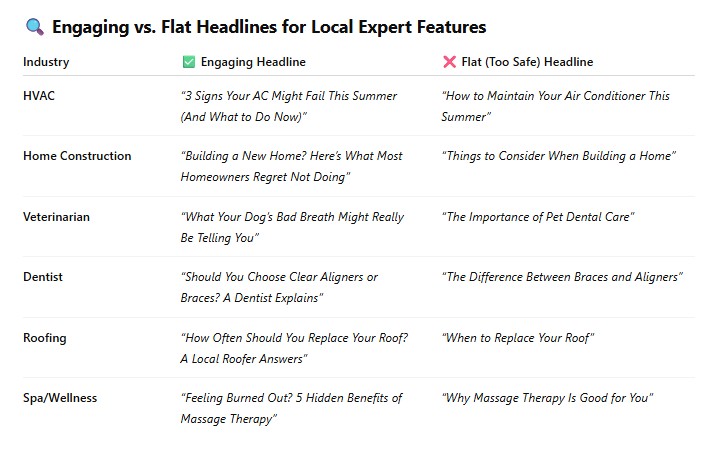BRANDING: A brand is the sum of all experiences, perceptions, values, and expectations associated with a business or product, expressed through its name, logo, voice, style, and customer interactions.
Ask the Expert is not about promoting the business, it’s about showing the value of their knowledge. Done right, the business earns trust, and then the call-to-action works.
What You’re Really Selling
- Ego Boost & Exclusivity
- “You’ll be the only [dentist/vet/contractor] featured as the site’s expert.”
- “This gives you credibility no one else in your industry can buy.”
- Third-Party Credibility
- “People trust what they see on a news site more than on a business’s own blog or social feed.”
- “This isn’t you saying you’re the best, this is us saying it, and that matters.”
- Evergreen SEO Value
- “Your article lives permanently on our site, not just for the day, but indexed by Google and discoverable over time.”
- Early Adopter Advantage
- “You’re getting in at the ground floor before others can; when we grow, you grow with us.”
- “You get to shape the voice of this section before it’s saturated.”
- Content You Can Reuse
- “Use the article on your social media, in email newsletters, and on your website. You’re not just paying for placement; you’re getting marketing material with built-in credibility.”
How We Brand a Local Advertiser as a Trusted Expert on Our News Sites
1. Local Expert Feature
- Publishes expert-driven native articles regularly,
- Answers real questions consumers are Googling
- Builds credibility over time
2. Promoted Native Articles
- Educational or insightful articles, not ads
- Appear in the news feed and carousel
- Tagged on social media and in the email newsletter
- The feature should be promoted on the radio to give experts additional frequency.
3. Banner Ads + Retargeting + SEM
- Banner ads increase visibility while readers consume news
- Banner ads that fall inside articles perform better when treated as editorial content, not logo-driven ads.
- Can an advertiser really be branded an Expert if they can’t be found in Google Search?
4. Section Sponsorships
- Their business name/logo on a relevant news section (e.g., “Weather brought to you by…” or “Health & Wellness Sponsor”)
- Repetition = familiarity = trust
- Sponsoring a relevant news section is not a performance-based sell. It is about pride and ownership. If you sell them a 970 X 250 Banner ad on a Landing Page, it is about continued brand association.
5. Social Media Mentions
- Our page tags them when their article is posted
- Post the article a minimum of 3 times the week it is published. This post can be scheduled out ahead of time.
- Ensure the sponsor also post the articles on their social. Their follows already know and like them, they will engage more than the followers on our news sites.
- Do a quick, 60 second video of the sponsor address the topic of the article. Turn this into a reel for Instagram and Facebook.
6. Expert Badges & Decals (COMING SOON)
- “ClarksvilleNow Expert” window decals or digital badge for their site/social
- Gives third-party validation from a credible source
WHAT ARTICLES WORK (and why it performs):
1. Educational content that answers common questions
- Example: “What’s the best age to start orthodontic treatment?” (from an orthodontist)
- Why it works: Builds trust, gets searched, and shows off the client’s knowledge.
2. Seasonal or timely advice from the expert’s perspective
- Example: “3 Things You Should Do for Your HVAC System Before Summer Hits”
- Why it works: Practical, helpful, and shows industry awareness.
3. Myths vs. Facts or Top Mistakes Lists
- Example: “5 Common Mistakes People Make When Choosing Home Insurance”
- Why it works: This format makes the article skimmable and shareable while still delivering value.
4. Buyer’s guides or decision-making frameworks
- Example: “How to Choose the Right Retirement Plan Based on Your Stage of Life”
- Why it works: Gives the reader tools and positions the advertiser as a trustworthy advisor.
5. Articles that answer “Why does this matter to me?”
- Example: “Why Every Homeowner Needs a Yearly Roof Inspection — Even If Nothing Looks Wrong”
- Why it works: Connects the expert’s services to the reader’s real-world concerns.
WHAT DOESN’T WORK (and underperforms):
1. Press releases or event promos disguised as articles
- Why it doesn’t work: It reads like an ad, not helpful content. People ignore it or bounce quickly.
2. Generic business profiles with no unique angle
- Why it doesn’t work: “We’ve been serving the area since 1995” is not a hook — it’s a snooze.
3. Listing services without storytelling or value
- Why it doesn’t work: “We offer auto, home, and life insurance” is just a brochure, not content.
4. Overloaded with jargon or salesy language
- Why it doesn’t work: People don’t want to be sold to — they want to learn something or solve a problem.
5. Articles without a compelling title or hook
- Why it doesn’t work: If the title doesn’t make you want to click, the article won’t get read.
Lead with a question: Start the article with a question the reader might ask Google.
Use real examples or anecdotes: It makes the expert relatable and their advice credible.
Include a clear CTA at the end: “Schedule a consultation,” “Call us to learn more,” etc.
Get a quote or tip directly from the client: Make it sound like them, not us.
Think SEO: Use searchable phrases like “best way to,” “how to,” or “should I.”
Which Headline Would You Chose to Read?

When creating a headline, ask:
- Does it answer a common question?
- Does it spark curiosity?
- Would you click on it if you saw it on Facebook?
WHY THIS MATTERS:
The flat headlines:
- Sound like textbook titles
- Don’t create urgency or curiosity
- Don’t hint at insider knowledge or personal experience
The engaging headlines:
- Use a question, list, or emotional trigger
- Make the expert look like they’re solving real problems
- Increase the chance of being shared or clicked
How To Coach Your Experts to Capitalize on this Opportunity
1. Provide Insight, Not Sales Pitches
- They must answer real questions, not just promote their services.
2. Give Us Real Quotes or Perspectives
- Their voice and tone must be in the article to make it feel authentic.
3. Promote the Article Themselves
- Share it on their social media, link to it from their website, post it in their newsletters only promotes the ownership of the information.
4. Be Consistent
- One article is okay; a series builds expertise. Repetition builds recognition and search value.
5. Respond to Engagement
If someone comments or asks a question on the article or social post, they (or we on their behalf) should respond, show they’re engaged.
Tips to Help Close the Deal
- Avoid the word “advertising” — use “expert feature,” “trusted voice,” or “educational content.”
- Show mockups of what it will look like on the site and social media.
- Emphasize social sharing: “You’ll be tagged on Facebook to our [5K/10K] followers.”
- Offer exclusivity in their field, this increases urgency. “We have these 12 articles that we are going to publish monthly, do you want to be the Expert associated with them. We will have a local XXX.
- Use the client’s name in examples:
“Imagine the article titled ‘Dr. Smith Answers the Most Common Questions About Braces.’ That’s not an ad, that’s authority.”
Industry Specific Article Bundles You Can Use:


